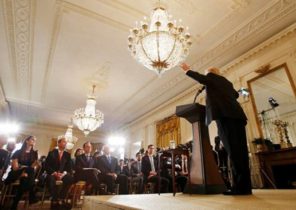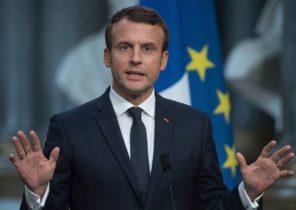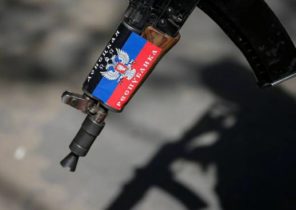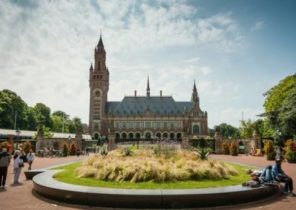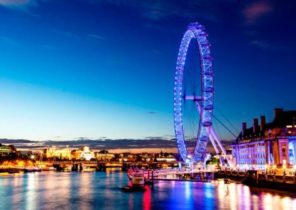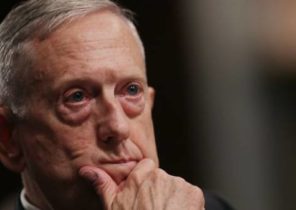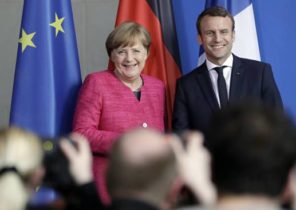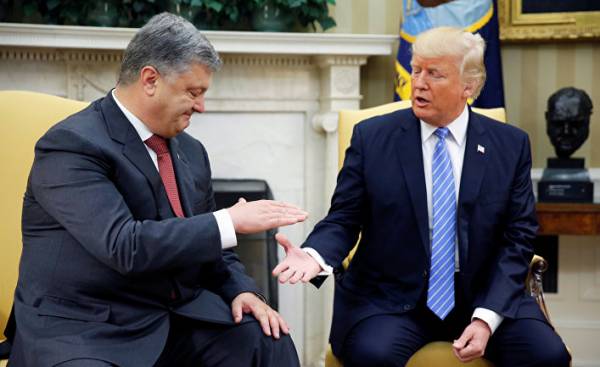
The first meeting of Petro Poroshenko and Donald trump, held on 20 June, was recognized as a small but important victory of Ukraine. It signals the continued support from the United States at a time when many fear that Ukraine’s struggle with Russia could turn into all the forgotten war. The only fly in the ointment was that the trump of the article when referring to Ukraine (The Ukraine), which caused a predictable wave of discontent.
Many reviewers prefer to see this lapse is yet another example of supposedly amateurish and ignorant of trump’s approach to international relations. However, in fairness it should be noted that the present occupant of the White house is not alone in the incorrect naming of Ukraine. His predecessor, Barack Obama also repeatedly referred to “The Ukraine”. In recent years, many international leaders were involved in the misconduct.
Many do not know, why the use of the definite article in the name of the country is such a big problem for Ukrainians. This blunder usually compare with another English language stimulus for the Ukrainian community — a dispute about the correct spelling of the name of the Ukrainian capital “Kiev” or “Kyiv”. But it’s not a fair comparison. There are good arguments in favor of the fact that the names of cities in English are often different from the original name in the native language (Moscow, Florence and Munich are obvious examples). But the use of the title “the Ukraine” gets to the heart of the centuries-old struggle of the nation for the establishment of an independent state.
Many countries include the word “the” in their names. But it usually refers to a noun in the plural or countries with a specific system, for example, The United States of America, The Netherlands or The Philippines. This logic may not apply in the case of Ukraine. Instead, seemingly innocuous use of this short word of three letters instantly reduces the country to the status of the geographic area such as the Midwest, the Ardennes or the Algarve. And objections of the Ukrainians in this case is not just pedantry. It is a question of national honor and of historical justice.
There is reason to believe that such subtle linguistic assault on Ukrainian sovereignty is not an accident. The term “The Ukraine” were first used in the Soviet era, at a time when the Kremlin was particularly eager to confront the global perception of Ukraine as a separate and unique nation. It was the smallest of the Soviet crimes committed against the national aspirations of Ukraine.
The famine-induced genocide in the early 1930s, was a direct blow to the agrarian heart of the Ukrainian nation, and the destruction of the Ukrainian intelligentsia during Stalin’s terror — a deliberate attempt to decapitate the nation. Until the collapse of the Soviet regime, one of the key internal battles for the Kremlin remained a struggle with the movement for the independence of Ukraine. Even at the dawn of perestroika in the mid 1980-ies, Ukrainians accounted for about half of political prisoners languishing in the Gulag. Many were told that in the camps it was easier to speak Ukrainian than Soviet Ukraine.
Unfortunately, little has changed over twenty-six years since the collapse of the Soviet Union. And even in the chaos of 1991, Russia reluctantly agreed to the idea of Ukrainian independence, but few seriously suggest that the Kremlin and most Russians ever made a reality with a truly sovereign and independent Ukrainian state. In this context, we can recall very eloquent shock and horror expressed throughout Russia during the orange revolution in 2004. For ordinary Russians, who treated Ukraine as an informal continuation of the Russian Federation, this Pro-European uprising was a real act of betrayal.
The current hybrid war in the East of Ukraine exposed the fullness of the post-Soviet Imperial pretensions of the Kremlin, revealing the essence of modern Russia, openly contemptuous of the claims of Ukraine on the state. Kremlin TV is a regular venue for those who believe that Ukraine is an artificial and inferior country, and the President of Russia Vladimir Putin during the annual straight line rather strange speaks of “territories which are now called Ukraine.”
Putin can be considered a champion of denial of the Ukrainian statehood. In 2008 he told the US President George Bush that Ukraine is “not even a country”. He also publicly declared his belief that Russians and Ukrainians “one people”. This statement directly denies Ukraine’s independence and implies membership in the Russian world. This conviction is especially significant for the mindset of Putin. He considers Ukraine to be its internal affair and not a foreign policy issue, hence his willingness to take extreme measures, he does not dare to use in the international arena. This perception of Ukraine he shared with millions of Russians. In their eyes, these separatists are Ukrainians themselves.
When world leaders say “The Ukraine”, it is reasonable to assume that they do not have the support of Russia’s campaign against Ukrainian statehood. They just don’t know about the baggage that accompanies the phrase. They are no different from the vast majority of the international community, not suspecting that the struggle for Ukraine’s independence was one of the longest and deadliest in history.
However, the time has come to draw a line under the clunky phrase “The Ukraine” and to start expressing the country the respect it deserves. Ukraine is at the forefront in hybrid war against a resurgent Russia that seeks to eliminate the security system of the postwar world and reverse the outcome of the cold war. While politicians in the US and the EU are worried about fake news and interventions in the elections, the Ukrainians are paying with their lives. The least we can do is to correctly pronounce the name of the country.
